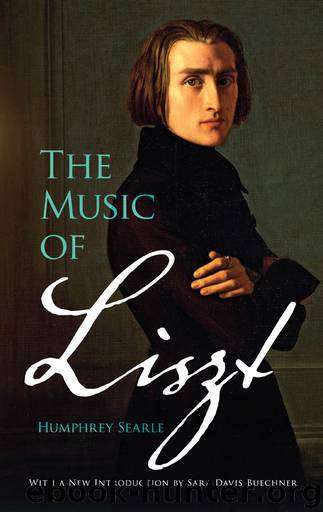The Music of Liszt by Humphrey Searle

Author:Humphrey Searle
Language: eng
Format: epub
Publisher: Dover Publications
Published: 2013-04-19T04:00:00+00:00
The finale, Mephistopheles, is in some ways the most remarkable movement. It is based entirely on the Faust themes, but in a parodied form—Mephistopheles, the spirit of negation, can only destroy, not create. There is one new theme—the “pride” motive from the Malediction concerto (Ex. 19, p. 48), and Gretchen’s theme makes a brief appearance in the middle of the movement in its original form—she alone cannot be touched by the Devil. The whole atmosphere is brilliantly conceived and portrayed; even to-day it sounds sinister enough. Liszt originally intended to end the work purely orchestrally, with the disappearance of Mephistopheles and a reference to the Gretchen theme and the “heroic” Faust motive; but three years later he added a coda in the form of a choral setting of the Chorus Mysticus which closes Part II of Goethe’s Faust, and there is no doubt that he was right to do so, for the entire work is summed up and given its true perspective by this solemn and triumphal music. Liszt was truly inspired when he wrote the Faust Symphony; it expresses every variety of mood with the utmost clarity and dramatic emphasis, yet one never feels that the music is forced or artificial. It simply poured out of him quite naturally; though the symphony lasts over an hour one does not get the impression that it is overlong for what it has to say, for it is all deeply and genuinely felt. Many think, and I would agree, that in this work Liszt produced his masterpiece.
The Dante Symphony is more open to discussion, though curiously enough Liszt here felt a stronger instinctive affinity with his subject. He had read Dante with Marie d’Agoult in the 1830s, and the first version of his Dante Sonata dates from as early as 1837; by 1847 he had already sketched out the principal themes of the symphony, and intended at that time to get the painter Buonaventura Genelli to design lantern slides to be shown during the performance of the music. But he did not start on the Symphony in earnest till the summer of 1855; and although it is a much shorter work than the Faust Symphony, it took him much longer to complete—about a year, in fact. His original idea had been to write three movements. Inferno, Purgatorio and Paradiso, to correspond with the three parts of Dante’s Divina Commedia; but unfortunately Wagner managed to persuade him that no human being could dare to portray the joys of Paradise, and therefore Liszt wrote instead a Magnificat which replaces the third movement. The result is a somewhat unbalanced work; and the listener is left in the transitional state of Dante at the end of the Purgatorio section, where he gazes up at the heights of Heaven and hears its music from afar.
Nevertheless the Dante Symphony contains a good deal of fine music, particularly in the first movement (on which, incidentally, Tchaikovsky’s Francesca da Rimini appears to have been closely modelled). It begins with a
Download
This site does not store any files on its server. We only index and link to content provided by other sites. Please contact the content providers to delete copyright contents if any and email us, we'll remove relevant links or contents immediately.
The Goal (Off-Campus #4) by Elle Kennedy(13655)
Kathy Andrews Collection by Kathy Andrews(11812)
Diary of a Player by Brad Paisley(7559)
Assassin’s Fate by Robin Hobb(6198)
What Does This Button Do? by Bruce Dickinson(6194)
Big Little Lies by Liane Moriarty(5790)
Altered Sensations by David Pantalony(5093)
Pale Blue Dot by Carl Sagan(4996)
Sticky Fingers by Joe Hagan(4188)
The Death of the Heart by Elizabeth Bowen(3605)
The Heroin Diaries by Nikki Sixx(3543)
Confessions of a Video Vixen by Karrine Steffans(3301)
Beneath These Shadows by Meghan March(3298)
How Music Works by David Byrne(3259)
The Help by Kathryn Stockett(3139)
Jam by Jam (epub)(3072)
Harry Potter 4 - Harry Potter and The Goblet of Fire by J.K.Rowling(3057)
Computational Linguistics and Intelligent Text Processing: 20th International Conference, CICLing 2019 La Rochelle, France, April 7â13, 2019 Revised Selected Papers, Part I by Alexander Gelbukh(2981)
Strange Fascination: David Bowie: The Definitive Story by David Buckley(2857)
